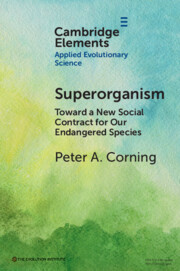Element contents
Superorganism
Published online by Cambridge University Press: 23 June 2023
Summary
- Type
- Element
- Information
- Online ISBN: 9781009400404Publisher: Cambridge University PressPrint publication: 03 August 2023
Bibliography
- 6
- Cited by

